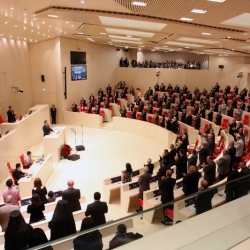
Ron Stephens and Brandon Beach have sponsored gambling bills in the Georgia legislature in prior years.
Georgia lawmakers who want to pass gambling legislation have changed their focus in 2019. State Rep. Ron Stephens and State Sen. Brandon Beach each have introduced gaming bills this year, but they are less ambitious than the “destination luxury casino” bills of years past.
Stephens’ bill would create a state gaming commission which would consider new forms of gambling to fund the HOPE Scholarship Fund. Beach’s bills would foster a horse racing industry in Middle and South Georgia.
In recent years, the Georgia state legislature has rejected several destination casino bills. Lawmakers similarly rejected a daily fantasy sports bill, which was enough to convince gaming proponents that a sports betting legalization bill was not even worth the time to draft.
With new Gov. Brian Kemp and Lt. Gov. Geoff Duncan taking over for the departed Gov. Nathan Deal and Lt. Gov. Casey Cagle, respectively, Georgia lawmakers say they cannot gauge the chances of success of either bill.
What is known is the previous tactics have not worked. From 2015 to 2017, several land-based casino bills failed. Those failures have led to a reaction from the brand name gaming companies which sought to build businesses in Georgia. Where once gaming groups contributed more than $200,000 a year in political donations, the haul last year amounted to $50,000 for MGM Resorts and $31,000 from IGT.
Ron Stephens’ Gaming Commmission Bill
The most substantial draft legislation comes from Rep. Ron Stephens (R-Savannah), the chairman of the House Economic Development and Tourism Committee and the main supporter of recent casino bills. Ron Stephens introduced a bill which would create a Georgia Gaming Commission.
Once in existence, the gaming commission would determine the best ways to expand gambling in the state. As in years past, Ron Stephens says the purpose is to generate hundreds of thousands of dollars to help HOPE Scholarship recipients.
To support the gaming commission bill, Stephens said, “We’ve had the lottery for more than 25 years. We’re at that point after 25 years that we need to reassess if we want to do it or we don’t want to do it.”
Critics will say that Ron Stephens wants to win the battle through sap what he could not win through storm. Instead of convincing lawmakers to pass an integrated casino resort bill, Stephens wants to build a gaming commission that then would push for gambling expansion — perhaps even a casino bill.
Ron Stephens said he might one day focus on a casino bill again, but for now was focusing on creating a gaming commission.
Brandon Beach’s Horse Racing Bill
Sen. Brandon Beach (R-Alpharetta), the chairman of the Senate Transportation Committee, is taking a similar approach. In recent years, attempts to legalize race track/casinos or “racinos” failed. Once again, conservative religious groups have opposed such gaming as immoral and prone to increase crime, so all attempts to create horse tracks with slot machines have been rejected.
The Senate Transport chairman is taking one or two steps back. Instead of legalizing a racino, Beach wants to create a horse racing industry first. Beach said he thinks Georgia is a natural stop for horse racing, because each year 80,000 race horses are transported from Florida race tracks like Tampa Bay Downs to tracks in Kentucky such as Churchill Downs or Keeneland Racecourse.
Sen. Beach said, “We need to be in the equine industry. There’s more to it than racing. There’s horse farms and hay farms and breeding and auctions.”
How Race Track Casinos Happen
If the pattern that race track betting has taken in other states follows in Georgia, then Beach’s legislation would create horse racing alongside pari-mutuel wagering, which is considered less troublesome because it involves bettor-vs-bettors wagers instead of bettors-vs-house scenarios, which are more weighted against gamblers. Also, horse betting has fewer betting opportunities than slots, blackjack, or roulette, so gaming addiction is considered less of a danger.
Horse racing is seen as a declining part of the gaming industry. If the pattern holds from other states, race track owners might argue in a few years they need slot parlors to maintain economic viability. This might lead to race track casinos as seen in Pennsylvania, Massachusetts, New York, and Florida.
Looking two steps ahead, Georgia might one day approve full casino gambling for their race tracks — the way Arkansas did in 2018 for Southland Racecourse and Oaklawn Park.
Will Georgia Pass Gambling Bills in 2019?
Either bill is a long shot to gain traction in 2019. Gov. Brian Kemp and Lt. Gov. Geoff Duncan each have said they are against casinos, though neither has weighed in on pari-mutuel wagering or a gaming commission. To increase funds for the HOPE Scholarship, either or both might back Stephens’ or Beach’s bills.
If the past is prologue, then both bills will go down to defeat. Rep. Ron Stephens and Sen. Brandon Beach remain indefatigable proponents of Georgia gambling, though.
